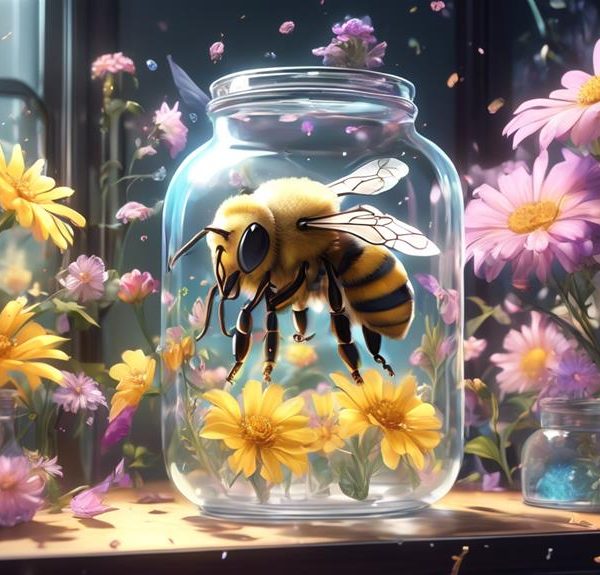An essential guide to understanding the feasibility and considerations of buying bees for your garden; a decision that could change your ecosystem.
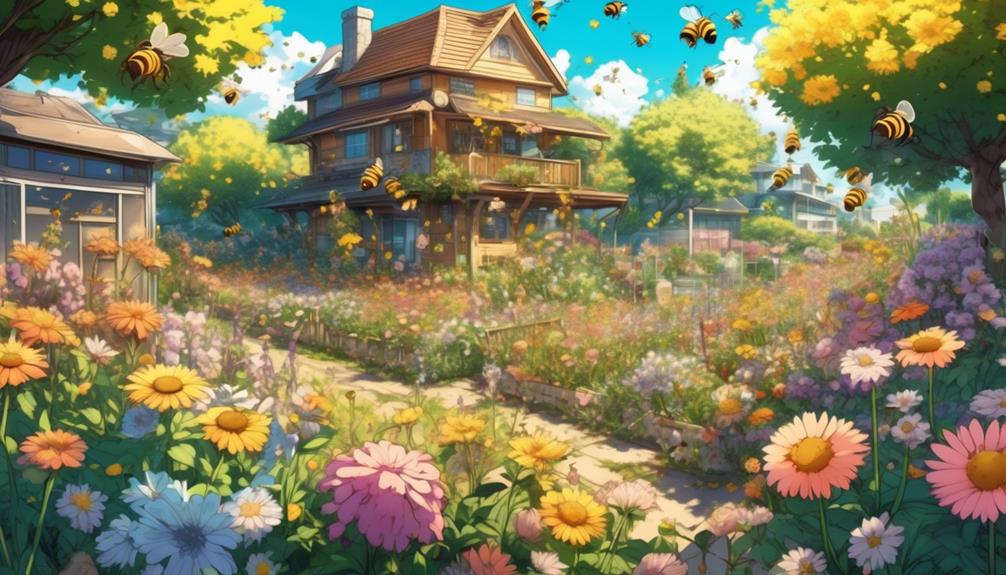
Can You Buy Bees for Your Garden?
Did you know that a third of the food we consume each day relies on pollination, mainly by bees? Yes, these buzzing creatures play a crucial role in our ecosystems and are indispensable to our food security.
You may be wondering if it's possible to buy bees for your garden, not only to support these vital pollinators but also to reap the benefits of increased plant growth and productivity. While it's indeed an intriguing idea, there are several factors you'd need to consider before you go ahead and order a colony online.
This discussion aims to shed light on those considerations, and by the end of it, you'll have a clear idea of whether or not beekeeping is right for you.
Key Takeaways
- Bees are crucial for pollination and food security, as they transfer pollen for the reproduction of flowering plants.
- Honey bees, bumble bees, and solitary bees are different options to consider when purchasing bees for your garden.
- Local beekeepers, online bee suppliers, and agricultural supply stores are sources to buy bees from, but research reputable sources and read customer reviews.
- To sustain a healthy bee population, provide a variety of nectar and pollen-rich plants, avoid harmful pesticides, and create shelter and water sources in your garden.
Understanding the Importance of Bees
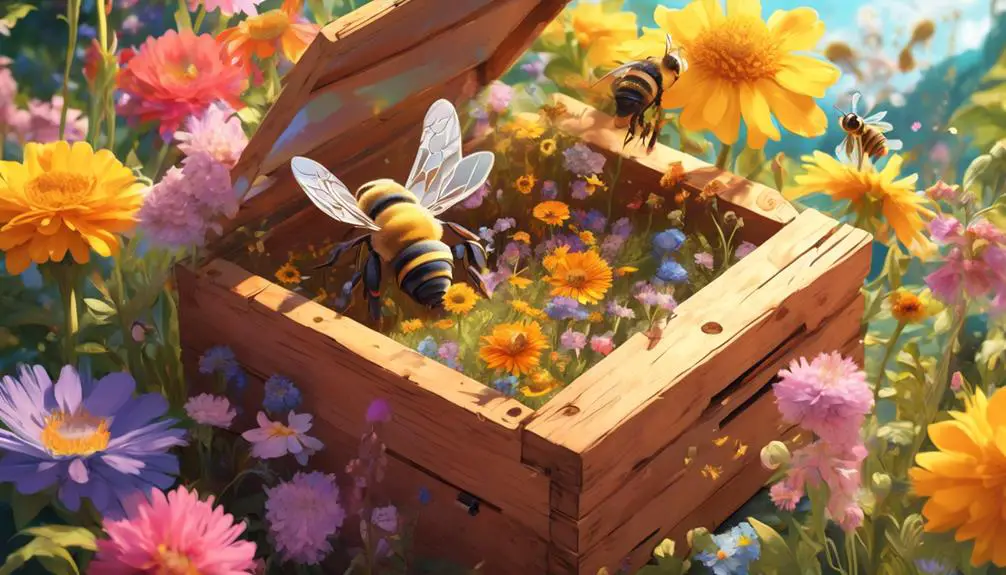
Before diving into the specifics of buying bees, it's crucial to understand why these little pollinators are so vital for your garden. Bees play a critical role in maintaining the health and vitality of your garden's ecosystem. They're not just buzzing pests, they're industrious workers, tirelessly transferring pollen from one flower to another. This process, called pollination, is essential for the reproduction of most flowering plants.
In fact, nearly 70% of the world's flowering plant species rely on pollinators, like bees, to reproduce. That's a massive percentage, right? Well, it's not just about the flowers. These plants provide the fruits, vegetables, and nuts that nourish us and many other species. Without bees, these food sources would drastically diminish.
Moreover, bees also help to enrich the soil by aiding in the decomposition of organic material. They even contribute to genetic variation in plants through cross-pollination, helping to maintain biodiversity. So, to put it simply, bees are the lifeline of your garden and our global ecosystem.
Therefore, introducing bees into your garden isn't just about improving your blooms. It's about contributing to a sustainable environment and food system. So, let's explore how you can do that.
Types of Bees to Purchase

Now that you grasp the pivotal role bees play in your garden's ecosystem, let's identify the various types of bees you could consider purchasing. Your choices largely revolve around honey bees, bumble bees, and solitary bees.
Honey bees, specifically the Western honey bee or Apis mellifera, are renowned for their honey production and pollination capabilities. They're sociable insects, living in large colonies with a complex social structure. If you're interested in honey production and don't mind managing a hive, then honey bees could be an excellent choice.
Next are the bumble bees. They're robust, fuzzy insects that operate in smaller colonies compared to honey bees. Their ability to 'buzz pollinate' makes them perfect for plants like tomatoes and blueberries. If you're keen on a low-maintenance option, consider Bombus species.
Buying Bees: How and Where
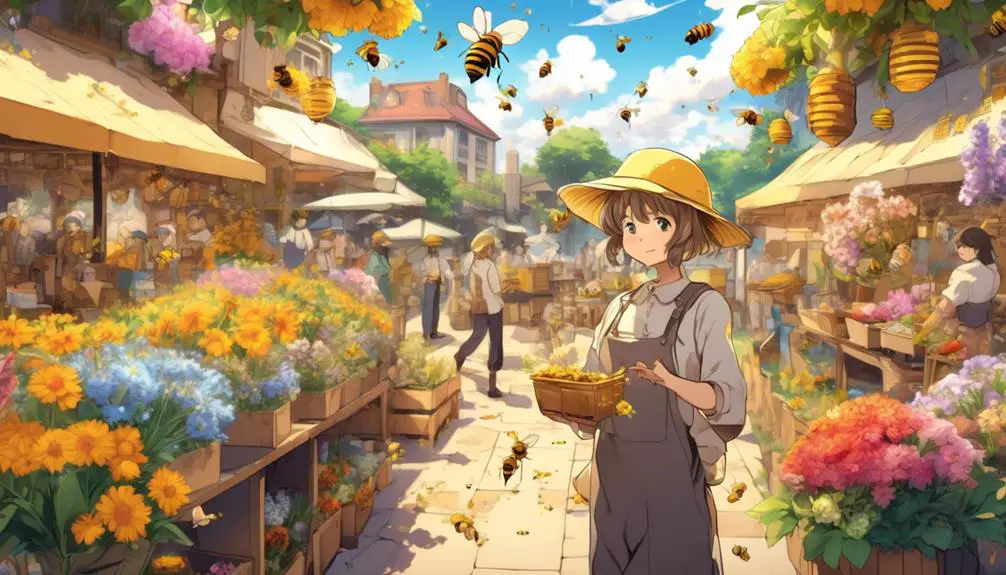
Having decided on the type of bees that best suit your needs, it's crucial to understand how and where you can purchase them for your garden. There are several reputable sources to buy bees, depending on your location and the specific type of bees you're looking for.
Local beekeepers are often the best source. They can provide you with healthy local bees, adapted to your area's climate and flora. This is beneficial because these bees are more likely to thrive in your garden. You can find a local beekeeper through beekeeping clubs or associations in your region.
Another option is online bee suppliers. They offer a variety of bee species shipped directly to your doorstep. Websites like Mountain Sweet Honey and Package Bees for Sale are great places to start. However, be aware of the risks involved in shipping live bees. Ensure the supplier is reputable and has good customer reviews.
Finally, you can purchase bees at agricultural supply stores. Stores like Tractor Supply Co. or Orscheln Farm and Home often carry package bees during the spring.
Regardless of where you buy, make sure you're prepared for their arrival. That means having your hive set up and ready for its new occupants.
Preparing Your Garden for Bees
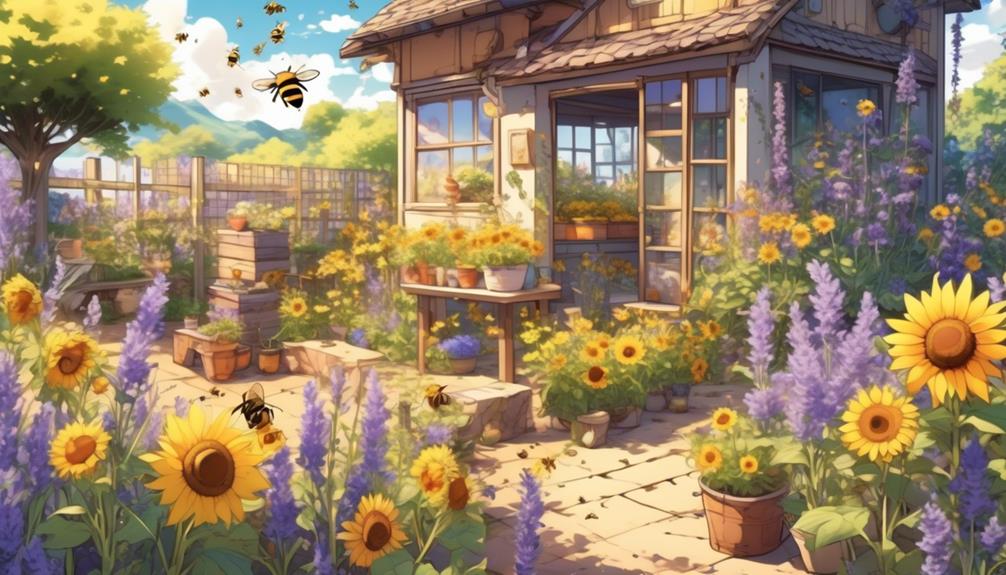
Once you've secured a reliable source for your bees, it's essential to focus on properly preparing your garden to welcome these new pollinators. This involves creating a bee-friendly habitat to ensure their survival and productivity.
Firstly, you need to provide a variety of nectar and pollen-rich plants. Opt for native plants as they're often more attractive to local bees. Ensure you've plants that bloom in different seasons to provide year-round food for the bees.
Secondly, consider water sources. Bees need water just like any other living organism. A shallow water dish with small stones for the bees to land on will suffice.
Thirdly, remember that bees need a place to rest and reproduce. Leave some areas of your garden undisturbed and a little wild. Deadwood, hollow stems, and bare earth are perfect nesting spots for many bee species.
Lastly, avoid using pesticides. They're harmful to bees and can drastically reduce their population. If you must, choose organic and bee-friendly pesticides.
Sustaining a Healthy Bee Population
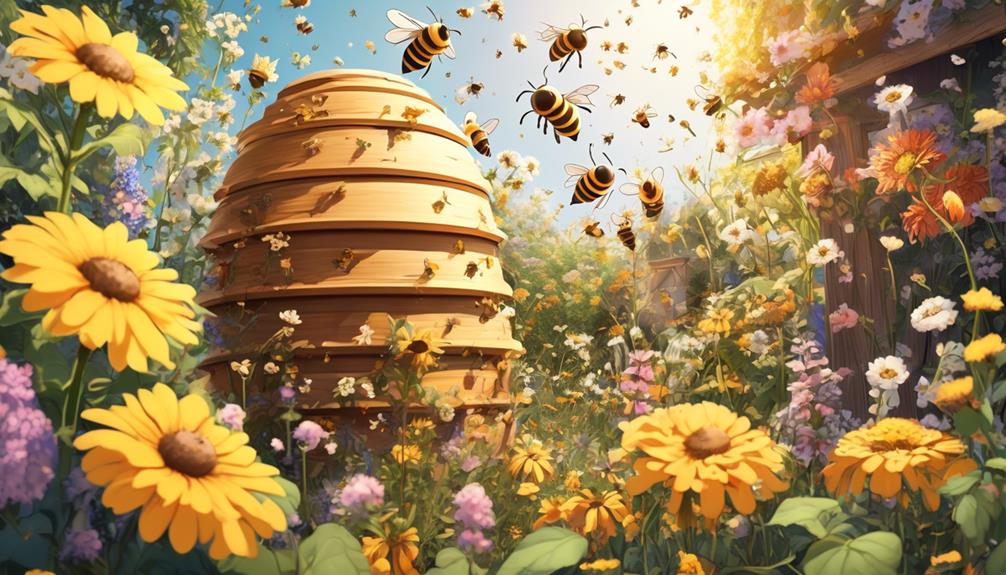
To sustain a healthy bee population in your garden, you'll need to prioritize their ongoing needs and monitor their habitat regularly for any potential threats.
Bees require a consistent water source, so consider installing a birdbath or rain garden. They'll also need a diverse range of nectar and pollen sources throughout the year. Native plants are best, as they're well adapted to local climate and soil conditions.
Pesticides can devastate bee populations, so it's critical you avoid them. If you must use them, opt for organic options and apply them at night when bees are less active.
Bees also require shelter to thrive. Consider leaving a section of your garden untidy with dead wood and tall grass, providing a natural habitat for bees.
Monitoring is key in maintaining a healthy bee population. Regularly check for signs of disease or parasites. If you notice a decline in bee activity or visible signs of ill health, consult with a local beekeeper or entomologist for advice.
Frequently Asked Questions
What Are the Legal Requirements for Owning Bees in My Area?
Absolutely, you can own bees! However, local regulations vary. You'll need to check with your city or county's zoning laws and health department regulations. Some areas may require permits, inspections, or specific distances from property lines. It's also wise to check with your homeowners' association for any restrictions.
Also, remember beekeeping involves responsibility for their health and wellbeing. It's not just about your garden, it's about supporting a vital ecosystem.
How Much Time Does It Typically Take to Care for a Bee Colony?
Caring for a bee colony isn't too time-consuming. You'll spend about 30 minutes per week monitoring the hive for pests, diseases, and honey production. During honey harvesting season, you'll put in a few extra hours.
It's not a full-time job, but you can't neglect it either. Remember, a healthy, thriving bee colony requires your attention and commitment.
It's a small investment for the big return of a blooming garden and delicious honey.
Can I Harvest Honey From the Bees in My Garden and How Can I Do It?
Yes, you can harvest honey from your garden bees.
First, you'll need a bee suit, smoker, and hive tool.
Wait until the honeycomb is 80% capped.
Then, smoke the hive entrance to calm the bees.
Remove the frames with the hive tool, brush off the bees gently, and extract the honey using a honey extractor.
Always leave enough honey for the bees to survive, especially during winter.
It's a delicate balance, but rewarding when done right.
What Are the Risks Involved in Beekeeping, Especially for Children and Pets?
Absolutely, you can buy bees for your garden. They're great for pollination and can increase your garden's productivity. However, you'll need to manage them properly.
Do your homework before buying a hive. Learn about their needs, the best practices for care, and their potential impact on your local ecosystem. With good management, they'll be a beneficial addition to your garden.
Don't forget to check local regulations about keeping bees, as some areas may require specific permits.
Can Bees Coexist With Other Wildlife in My Garden?
Absolutely, bees can coexist with other wildlife in your garden. They're important pollinators and a vital part of the ecosystem.
Their presence can actually boost the health and diversity of your garden's flora and fauna. However, it's crucial to provide a safe environment for them, like avoiding pesticides.
Conclusion
So, you're ready to buzz up your garden? Buying bees isn't just possible, it's beneficial for the environment too.
Remember, it's not just about purchasing the right type, you've got to prep your garden and ensure a sustainable habitat.
Let's transform your garden into a buzzing paradise, helping our striped friends and your blossoms thrive.
Our ecosystem needs bees and now, you're a part of this vital cycle. Embrace your role and enjoy the hum of success.

